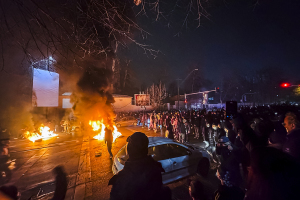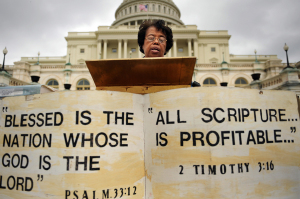Why did Peter quote from the book of Joel on the day of Pentecost?

When Peter tried to explain the strange happenings of Pentecost — a wind filling the upper room, tongues as of fire on the men and women there, the inexplicable ability of people from far-flung corners of the Roman Empire to understand the words of Galilean farmers and fishers — he had any number of Old Testament prophecies to appeal to. He might have seen Pentecost as the fulfilment of Isaiah 32:15, when a Spirit would be “the Spirit is poured on us from on high, and the desert becomes a fertile field, and the fertile field seems like a forest. The LORD’S justice will dwell in the desert, his righteousness live in the fertile field. The fruit of that righteousness will be peace; its effect will be quietness and confidence forever” (Isaiah 32:15-17, NIV). What a magnificent vision of peace and prosperity!
But Peter didn’t quote from Isaiah 32:15.
He might have quoted Isaiah 44:3-4, in which God promised, “or I will pour water on the thirsty land, and streams on the dry ground; I will pour out my Spirit on your offspring, and my blessing on your descendants. They will spring up like grass in a meadow, like poplar trees by flowing streams.” Another beautiful promise of the Spirit outpoured — a perfect backdrop for Pentecost.
But Peter didn’t quote from Isaiah 44:3-4.
He might even have quoted from the magnificent promise of Ezekiel 39:29: “I will no longer hide my face from them, for I will pour out my Spirit on the people of Israel, declares the Sovereign LORD.” God revealed fully and finally — no exceptions!
But Peter didn’t quote from Ezekiel 39:29. In fact, Peter didn’t quote from any passages from famed Old Testament prophets. Instead, he quoted from the minor prophet Joel. This is a strange – if inspired – decision.
A stunning promise
Wedged between the books of Hosea and Amos, the book of Joel lacks their vividness and vitality. There’s no timeless plea to “let justice roll down like waters, and righteousness like an ever-flowing stream” (Amos 5:24). There’s no unforgettable marriage to a prostitute, as in the book of Hosea. Joel’s prophecy, in fact, pales in comparison with most of the prophetic books in the Old Testament. There’s little to excite the imagination, to carve a stone of hope out of a mountain of despair.
Except, that is, for one lightning bolt that irradiates an otherwise pedestrian collection of sayings, when Joel takes on the voice of God and imagines a day in the future:
“And afterward, I will pour out my Spirit on all people. Your sons and daughters will prophesy, your old men will dream dreams, your young men will see visions. Even on my servants, both men and women, I will pour out my Spirit in those days. I will show wonders in the heavens and on the earth, blood and fire and billows of smoke. The sun will be turned to darkness and the moon to blood before the coming of the great and dreadful day of the LORD” (Joel 2:28-31 [English]; 3:1-4 [Hebrew]).
This unbridled promise leaps out of the book of Joel. There’s little in Joel to excite the imagination other than a plague of locusts — until, that is, this promise of the outpouring of the Spirit.
The object of outpouring, all flesh, outstrips all other Israelite conceptions of outpouring. In other prophetic promises, the Spirit restores Israel (Isaiah 32:15), propels foreigners to join Israel (Isaiah 44:1-5), and promises the restoration of the land to Israel (Ezekiel 38:28-29). Joel promises much more because the scope of the Spirit includes all flesh. In the context of the book of Joel, all flesh would seem to mean all Israelite flesh. The book concludes, in fact, with a battle in the valley of Jehoshaphat and Judah (the southern kingdom of Israel) established in Jerusalem, surrounded by mountains that drip sweet wine and hills from which flow milk. This is a nationalistic vision of the future, a one-people promise.
In Joel’s promise of the Spirit outpoured, however, no such limit is apparent, and the unspecified introduction, “afterward,” suggests that Joel will not be pinned down to a historical fulfillment with specific nations. The words, all flesh, which can be taken at face value to include animals (e.g., Genesis 6:19), is typically a designation for all humankind (e.g., Genesis 6:12; Deuteronomy 5:26; Psalm 65:2; Isaiah 49:26; 66:23). This dream, a vision, extends even to the flesh of slaves.
In a book that otherwise travels a time-honored path, this outpouring of the Spirit is extraordinary. The inclusion of slaves devastates the rule of order. So too does the inclusion of women, daughters, and female slaves. In this respect, Joel has stepped well beyond the boundaries of his traditions. We are no longer dealing with respectable men, such as Abraham, Joseph, Moses, and Joshua, or even men of questionable integrity, such as Balaam, Jephthah, Samson, or Saul. For the one and only time in the entirety of Israelite literature, the Spirit is promised to women – and women of the lowest rank.
This is not a simple reordering of society, though it is that. This is not a redistribution of wealth, though it may be that. Nor does it only wrest authority from people who are privileged by dint of age or gender, though it certainly does that. The outpouring of the Spirit is also cataclysmic, part and parcel of “portents in the heavens and on the earth, blood and fire and columns of smoke,” when “the sun shall be turned to darkness, and the moon to blood, before the great and terrible day of the LORD comes.” This outpouring, though more dramatic and ominous, shares with Isaiah’s vision of the inspired ruler, on whom the Spirit rests, the expectation of an era when the world will shift — for human beings to a world of utter justice and for the rest of creation to a world as yet unknown and unknowable, when lion will lie down with lamb (Isaiah 11:1-9).
A singular promise fulfilled
So why did Peter quote Joel rather than Isaiah or Ezekiel on the day of Pentecost? Because Peter knew that what happened at Pentecost was outlandish, earth-shattering, boundless — flooding, not just Israel, but the whole world, east to west, bottom to top! We can’t capture the wind in our hands. We can’t hold the air in our lungs. We can’t limit the Spirit to one family or church or nation. The Spirit shatters our tidy borders.
Horizontally, the outpouring of the Spirit extends to all flesh—not just a single people group or state or nation or continent, as in the story of the elders. The words, all flesh, crush the rigid shell human borders, for “all flesh” elsewhere in the Jewish Bible includes animals (Genesis 6:19) and all of humankind (Genesis 6:12; Deuteronomy 5:26; Psalm 65:2; Isaiah 49:26; 66:23). Joel’s promise was exactly what Pentecost was all about: the shattering of every artificial boundary, every self-imposed human border, every pretense to privilege.
The Spirit also reaches vertically deep into society, from top to bottom, from distinguished men to their nameless female slaves. The Spirit is promised, not only to males, old and young, and to sons. It is also promised to daughters and to slaves, both male and female. There is a remarkable leveling out of society, a devastation of privilege, and an obliteration of all barriers, whether of money, age, gender, or status in society. Stunning! The Spirit melts the glue that holds society as we know it together in social tiers.
What will the impact of the Spirit be? Joel predicts a world without borders, disordered by everything except the splendid choreography of the Spirit that will result in a sort of social, national, and global vertigo. The divides we hold dear, the planes and plateaus that help us keep our equilibrium, the social strata that give many of us our secure place in the world — shattered! No castes. No classes. No echelons. No stations in life. Everyone is wet to the skin with the Spirit. Drenched. Dripping together in the cloudburst that equalizes us all. Face it. It’s hard to be dignified — stuck up, arrogant, superior — when you’re soaking wet, caught in a downpour. And Pentecost, Peter knew, was nothing less than a downpour of the Holy Spirit.



























